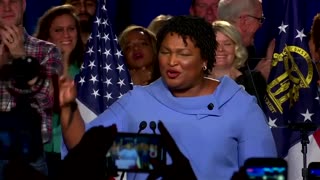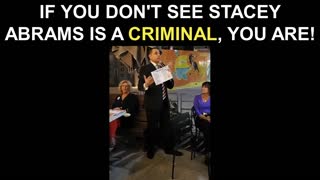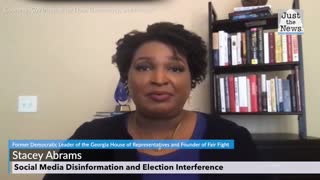2018-11-17 - Stacey Abrams - This Is Not A Concession Speech - 01m15s ( 720p )
FROM THE WIKIPEDIA ARTICLE:
https://en.wikipedia.org/wiki/Stacey_Abrams
2018 gubernatorial campaign
Main article: 2018 Georgia gubernatorial election
Abrams campaigning in 2018
Wikinews has related news:
Stacey Abrams becomes first black woman to gain major U.S. party nomination for governor of Georgia
Abrams ran for governor of Georgia in 2018.[31] In the Democratic primary she ran against Stacey Evans, another member of the Georgia House of Representatives,[31] in what some called "the battle of the Staceys". Abrams was endorsed by Bernie Sanders and Our Revolution.[32][33] On May 22, she won the Democratic nomination, making her the first black woman in the U.S. to be a major party's nominee for governor.[34]
After winning the primary, Abrams secured a number of high-profile endorsements, including one from former President Barack Obama.[35][36]
Almost a week before election day, the Republican nominee, Georgia Secretary of State Brian Kemp, canceled a debate scheduled seven weeks earlier to attend a Trump rally. Kemp blamed Abrams for the cancellation, saying she was unwilling to reschedule it. Abrams responded, “We refuse to callously take Georgians for granted and cancel on them. Just because Brian Kemp breaks his promises doesn’t mean anyone else should.”[37]
Two days before the election, Kemp's office announced that it was investigating the Georgia Democratic Party for unspecified "possible cybercrimes"; the Georgia Democratic Party stated that "Kemp's scurrilous claims are 100 percent false" and described them as a "political stunt."[38] A 2020 investigation by the Georgia Attorney General's office concluded that there was no evidence of computer crimes.[39] Later that year, it was revealed that the alleged cybercrime against Kemp's office was in fact a planned security test that one of Kemp's staff members had signed off on three months prior.[40]
As Georgia's secretary of state, Kemp was in charge of elections and voter registration during the election. Between 2012 and 2018, Kemp's office cancelled over 1.4 million voter registrations, with nearly 700,000 cancellations in 2017 alone.[41] On a single night in July 2017, half a million voters had their registrations cancelled. According to The Atlanta Journal-Constitution, election-law experts said that this "may represent the largest mass disenfranchisement in US history."[6] Kemp oversaw the removals as Secretary of State, and did so eight months after he declared that he was going to run for governor.[42] An investigative journalism group run by Greg Palast found that of the approximately 534,000 Georgians whose voter registrations were purged between 2016 and 2017 more than 334,000 still lived where they were registered.[43] The voters were given no notice that they had been purged.[44] Palast ultimately sued Kemp, claiming over 300,000 voters were purged illegally.[7] Kemp's office denied any wrongdoing, saying that by "regularly updating our rolls, we prevent fraud and ensure that all votes are cast by eligible Georgia voters."[45]
By early October 2018, more than 53,000 voter registration applications had been put on hold by Kemp's office, with more than 75% belonging to minorities.[46][41] The voters were eligible to re-register if they still lived in Georgia.[47][41][42][43]
Kemp's office was found to have violated the law before and immediately after the 2018 midterm elections.[48] In a ruling against Kemp, District Judge Amy Totenberg found that Kemp's office had violated the Help America Vote Act and said an attempt by Kemp's office to expedite the certification of results "appears to suggest the Secretary’s foregoing of its responsibility to confirm the accuracy of the results prior to final certification, including the assessment of whether serious provisional balloting count issues have been consistently and properly handled."[49][50]
Abrams lost the election by 50,000 votes. Abrams considered but ultimately did not mount a legal challenge to the election results.[51] In her speech ending her campaign,[52] she announced the creation of Fair Fight Action, a voting rights nonprofit organization that sued the Secretary of State and state election board in federal court for voter suppression.[53] As of March 2020, the lawsuit was still ongoing.[54]
Since losing the election, Abrams has repeatedly claimed that the election was not fairly conducted[55] and has declined to call Kemp the legitimate governor of Georgia.[56] Her position is that Kemp, who oversaw the election in his role as Secretary of State, had a conflict of interest and suppressed turnout by purging nearly 670,000 voter registrations in 2017, and that about 53,000 voter registrations were pending a month before the election.[55][57] She has said, "I have no empirical evidence that I would have achieved a higher number of votes. However, I have sufficient and I think legally sufficient doubt about the process to say that it was not a fair election."[55]
-
 1:52
1:52
Reuters
3 years agoFive things you should know about Stacey Abrams
83414 -
 0:11
0:11
John Di Lemme Ranting Away about How Ludicrous the Left Really Is...
3 years ago $0.33 earnedIf You Don't See Stacey Abrams is a Criminal, You Are!
2.35K3 -
 0:59
0:59
johndilemme
3 years ago $1.78 earnedRep. Vernon Jones Calls Out Georgia Failed Governor Stacey Abrams!
2.51K12 -
 1:53
1:53
Just the News
3 years agoStacey Abrams - Social Media Disinformation and Election Interference
18.6K12 -
 6:10:59
6:10:59
SNEAKO
9 hours agoSPIRITUAL WARFARE: SteveWillDoIt Calls In, Muslim Lantern debate analysis
151K80 -
 1:31:19
1:31:19
Fresh and Fit
8 hours agoHow Men Are FLIPPING The Script On GOLD Diggers With "Drizzle Drizzle"
84.1K88 -
 1:00:15
1:00:15
The StoneZONE with Roger Stone
8 hours agoFlorida Cannot Be Taken For Granted By Trump – MOSTLY PEACEFUL LATINAS Enter The StoneZONE!
43K13 -
 1:53:43
1:53:43
The Quartering
14 hours agoTIkTok Ban, Japan Nuke Debate, Woke College Meltdown, Billions For Ukraine
70.8K40 -
 2:42:11
2:42:11
TheSaltyCracker
7 hours agoColleges are Terrorist Factories ReeEEeE Stream 04-24-24
126K259 -
 2:24:15
2:24:15
WeAreChange
9 hours agoIlluminati Getting Exposed As Normies Awaken In Mass To Black Sex Magic!
49K52